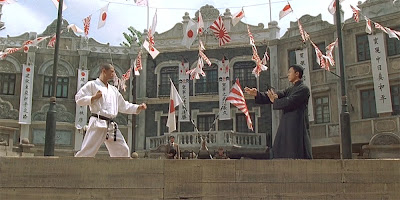11/29/2010
Martial Myths: Ip Man
Some time ago, I got to see Ip Man and its sequel Ip Man 2. A typical Hong Kong martial arts film usually functions as a series of set pieces designed to showcase the leads' physical prowess. So the genre's biggest stars are individuals who exhibit tremendous onscreen presence while executing balletic fight choreography. That's not an easy combination of attributes to find in one person. Donnie Yen certainly has the chops to fulfill that role. Ip Man is probably the most dynamic display of Yong Chun (Wing Chun) based combat in a feature film that I can recall, and I was impressed with the restrained use of wire-work. The tense battle between the hero Yip Man and ten Japanese budoka recalls the scene in Fist of Fury when Chen Zhen confronts a dojo full of incompetents.
Beyond the pretty hand-to-hand combat, there's a big pile of agitprop being worked into the crowd pleasing entertainment. Physical combat is an effective way to distill the good vs. evil dynamic. And past martial arts films have taken advantage of this to generate patriotic fervor, especially when the hero mops the floor with evil foreigners: Mongols, Manchu, Japanese, or Westerners. That's how indignant style vs. style arguments get started. And as with certain kinds of traditional literature, Hong Kong cinema plays fast and loose with the facts. The industry also gets to reinvent the lives of modern-age heroes like Wong Fei-Hung. With its numerous pro-Chinese (and pro-Confucian) statements, Ip man is one of the most unashamed efforts to incite populist sentiments since Bruce Lee played Chen Zhen.
For all its superior production values, Ip Man does feel like a regression. Its propaganda is not as subtle as that found in Jet Li's fictionalizing of another legendary fighter Huo Yuanjia in Fearless. It's facile message of Chinese unity contrasts with the real Yip Man's life. The historical figure was supposably an opium addict who moved to Hong Kong to avoid the Communist takeover of China. The political spin becomes more pronounced in the sequel when Yip Man confronts the British colonists who are consistently portrayed as cardboard villains. Thus the film presents an Asiatic counter-narrative: The citizens of Hong Kong are glad to be rid of those xenophobes (Beijing to Hong Kong: We own you now). The cliche of defeating the bigger and slower Westerner still pleases. The last act with its "we are all one" ending comes right out of Rocky IV. While the fight choreography is still very slick, the wire-work is far more obvious. The duel between Donnie Yen and costar Sammo Hung on a table looks comical next to the comparatively down-to-earth brutality of the fights in the original.
Which leads me to wonder: Is there anyone in Hong Kong who's working on the wuxia equivalent of the Revisionist Western? Anti-martial arts films that deconstruct the legends? To put it in comic book terms, does a chopsocky Alan Moore exist?

